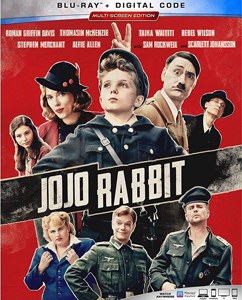The two most remarkable things about “Jojo Rabbit” (2019) are 1, that it’s a mainstream comedy about a kid who loves Hitler, and 2, that there’s nothing odd about this premise once you get into the flow of the movie. Writer, director and Hitler actor Taika Waititi locks into the unusual yet correct tone for this story of a Hitler Youth, Jojo (Roman Griffin Davis), who looks to his imaginary friend the Fuhrer for guidance and falls in love with a Jewish girl hiding in his walls.
History with a twist
“Jojo Rabbit” is as historically on point as, say, “Life is Beautiful” – maybe more so in some ways – but it shifts the perspective slightly to the side. And it’s off to this side where a weird brand of comedy plays out, although we check in on mainstream events such as hangings in the street enough that we don’t drift into fantasy land.
Part of the film’s strength is Waititi doing his against-expectations thing with Hitler, a trick he also uses as a vampire in “What We Do in the Shadows” and as a rock monster in “Thor: Ragnarok” (both of which he likewise helms). I like this type of comedy in smaller doses than some people do – I only got a few episodes into the “WWDITS” TV series – but I admit it is uniquely Waititi’s.

“Jojo Rabbit” (2019)
Director: Taika Waititi
Writers: Christine LeunensTaika Waititi
Stars: Roman Griffin Davis, Thomasin McKenzie, Scarlett Johansson
Another part of it is that “Jojo Rabbit” says life goes on even in the worst situations imaginable – an obvious statement that becomes profound again. Jojo is a Hitler Youth, but he’s also a 10-year-old kid like any other. It’s fascinating, yet also totally the right call, that mom Rosie (Scarlett Johansson, much more into this Nazi spoof than she is in “The Spirit”) accepts that her son loves Hitler and the Nazi Party. He’s going through a phase that he’ll grow out of, like kids do.
Rosie is hiding Elsa (Thomasin McKenzie) in a secret compartment in their house, and Elsa – although 17 — ends up being the first girl Jojo has a crush on. This relationship could fit in any coming-of-age film. Similar to Rosie’s approach, Elsa lets the kid use his own mind to figure things out as she tells him things about the Jewish race at his request.
Jojo is smart enough to figure out small examples of BS – such as Elsa’s assertion that Jews sleep by hanging upside down from the ceiling – and Elsa trusts that he’ll eventually figure out the bigger lies of the world.
Elsa and Jojo provide the reality
Elsa and Jojo are the movie’s firmly tethered people, with Rosie playing a role similar to the dad’s in “Life is Beautiful” – although it’s not as extreme here since Jojo is 10, rather than a smaller child. Rosie shows her son the good things about life, even though the war is going on.

On some level, it seems wrong that they should be at a beautiful green park during the time of World War II, but then a viewer realizes there’s no reason they can’t be, in the time before the bombers come.
The rest of the cast gets to lean into the absurdity more, including Sam Rockwell as a one-eyed drunken ex-soldier tasked with teaching kid soldiers. Rebel Wilson’s Chris Farley-like quality — wherein we expect something funny from her as soon as she appears on screen – is in full force here. She gets several amusing moments, from her assertion that she’s had 18 babies for Germany to the casualness with which she wields a pistol.
Stephen Merchant leads a funny sequence wherein he searches Jojo’s house as part of a Nazi patrol and we see how the greeting of “Heil, Hitler” can get unwieldy in a large group. (It’s not quite as funny as the film thinks, but that’s often the case with a repetition-based gag.)
I like how every time Jojo reunites with his second-best-friend Yorki (Archie Yates) (Jojo’s best friend is Hitler), it’s a happy moment, whether they are collecting scrap metal for the war machine or lugging around a rocket launcher as the Allied bombing attack begins.
Not clear-cut good and evil
“Jojo Rabbit” makes a good – but probably still controversial – point that a lot of Germans during the reign of Hitler were people like you and me. Many died at the hand of Hitler’s enforcers because they resisted his policies.
Some tried to lie low within the military ranks themselves; Wilson’s and Rockwell’s characters might not be shining examples of the human race, but they are fairly normal and relatable. The Germans as a citizenry were partly responsible for giving Hitler power, but at the same time, a given individual can only do what they can, as Rosie points out.
And when the Allied forces swooped in, people like you and me were among the casualties. Additionally, the Americans were not spick and span in their treatment of prisoners. Most war films and documentaries shy away from this reality. “Jojo” does not.
The Third Reich is at first glance an odd backdrop for a kid-oriented (though not kid-friendly, admittedly) coming-of-age story. At the end of “Jojo Rabbit,” I thought maybe it’s the ideal backdrop.

